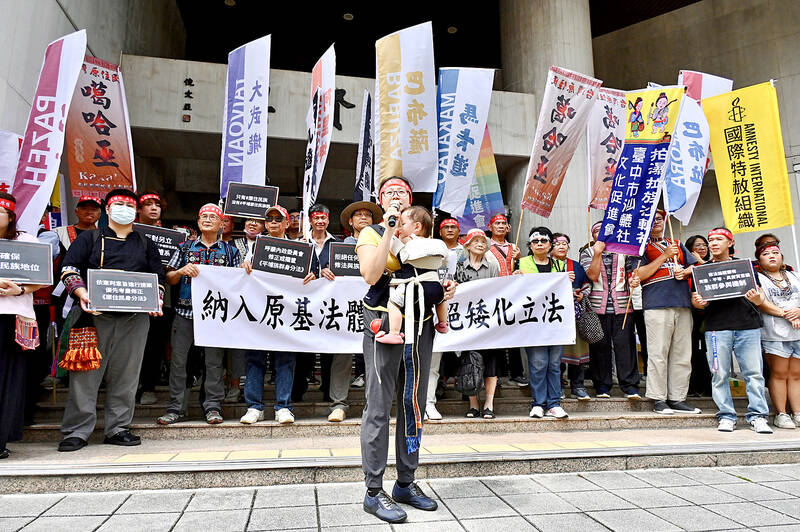Pingpu groups (平埔族群) yesterday held a news conference in front of the Legislative Yuan, urging an end to what they call the “systematic exclusion” of indigenous groups, and demanded official status and equal rights.
Wearing traditional clothing, they performed rituals and called on lawmakers across party lines to support equality, transitional justice and protection of indigenous rights for Pingpu groups.
The Pingpu does not refer to a single ethnic group, but is generally used to describe Taiwanese indigenous peoples originally residing in lowland regions.

Photo: George Tsorng, Taipei Times
Kaisanan Ahuan of central Taiwan’s Taokas and Pan Jiaqun of southern Taiwan’s Makatao led the event, and were joined by representatives from other Pingpu groups, including those from the Ketagalan, Pazeh, Kaxabu, Papora, Babuza, Siraya and Tavalong.
“It is time for the government to restore justice and recognize different Pingpu groups, as we are the original inhabitants of Taiwan descending from ancient Austronesian people. The government has for too long ignored our existence, adopting colonial policies to marginalize and exclude Pingpu groups, and deprive us of official status and rights,” Kaisanan Ahuan said.
“We demand recognition and rights to indigenous culture, language and collective identity, along with rights to education, natural resources and autonomy on ancestral domains. We also demand equality, protection of rights and access to the same services as the officially recognized 16 indigenous groups,” Pan Jiaqun said.
The groups said they opposed a legislative bill introduced by Chinese Nationalist Party (KMT) Legislator Sra Kacaw, an Amis, which they said would grant status recognition in name only and not include them in the Council of Indigenous Peoples.
“We urge lawmakers not to endorse Sra Kacaw’s bill, which would give Pingpu groups no protection of indigenous rights. It would turn us into lower-class indigenous people, and we do not want that,” Kaisanan Ahuan said.
“We oppose Pingpu groups being treated with the mindset of old colonial regimes. We refuse the new ways of ‘divide and conquer’ aiming to sow discord and conflict among indigenous peoples,” the groups said in a statement.
“The drafting of bills should adopt the core principle of equality, and include comprehensive discussion and meaningful input by indigenous peoples,” they said.
The Constitutional Court in 2022 ruled that the government’s denial of the existence of Siraya and other Pingpu groups was unconstitutional, and they, as original inhabitants of Taiwan, should have the same status as the 16 recognized groups.
The court gave the government a three-year deadline to implement laws.
Legislators and ministries should consult with Pingpu groups and hold public hearings, before amending the relevant statutes of the Indigenous Peoples Status Act (原住民身分法) and the Indigenous Peoples Basic Law (原住民族基本法), Kaisanan Ahuan said.

EVA Airways today confirmed the death of a flight attendant on Saturday upon their return to Taiwan and said an internal investigation has been launched, as criticism mounted over a social media post accusing the airline of failing to offer sufficient employee protections. According to the post, the flight attendant complained of feeling sick on board a flight, but was unable to take sick leave or access medical care. The crew member allegedly did not receive assistance from the chief purser, who failed to heed their requests for medical attention or call an ambulance once the flight landed, the post said. As sick

A drunk woman was sexually assaulted inside a crowded concourse of Taipei Railway Station on Thursday last week before a foreign tourist notified police, leading to calls for better education on bystander intervention and review of security infrastructure. The man, surnamed Chiu (邱), was taken into custody on charges of sexual assault, taking advantage of the woman’s condition and public indecency. Police discovered that Chiu was a fugitive with prior convictions for vehicle theft. He has been taken into custody and is to complete his unserved six-month sentence, police said. On Thursday last week, Chiu was seen wearing a white

The Taichung District Court yesterday confirmed its final ruling that the marriage between teenage heir Lai (賴) and a man surnamed Hsia (夏) was legally invalid, preventing Hsia from inheriting Lai’s NT$500 million (US$16.37 million) estate. The court confirmed that Hsia chose not to appeal the civil judgement after the court handed down its ruling in June, making the decision final. In the June ruling, the court said that Lai, 18, and Hsia, 26, showed “no mutual admiration before the marriage” and that their interactions were “distant and unfamiliar.” The judge concluded that the couple lacked the “true intention of

EVA Airways, one of the leading international carriers in Taiwan, yesterday said that it was investigating reports that a cabin crew manager had ignored the condition of a sick flight attendant, who died on Saturday. The airline made the statement in response to a post circulating on social media that said that the flight attendant on an outbound flight was feeling sick and notified the cabin crew manager. Although the flight attendant grew increasingly ill on the return flight, the manager did not contact Medlink — a system that connects the aircraft to doctors on the ground for treatment advice during medical